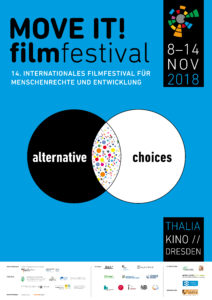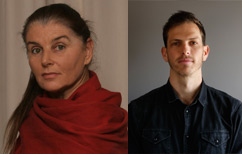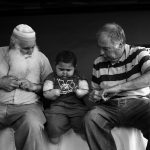Retrospective 2018
alternative choices
14. MOVE IT! Filmfestival 2018
08. -14. November 2018
14. MOVE IT! Filmfestival 2018
08. -14. November 2018



MUHI – GENERALLY TEMPORARY
(Israel/BRD 2017, 85 min)
von RINA CASTELNUOVO-HOLLANDER und TAMIR ELTERMANN
MUHI – GENERALLY TEMORARY
(Israel/Germany 2017, 85 min)
by RINA CASTELNUOVO-HOLLANDER and TAMIR ELTERMANN

Muhi, Sohn eines Hamas-Aktivisten, lebt seit er ein Säugling ist in einem israelischen Krankenhaus. Im Alter von zwei Jahren wurden ihm dort beide Arme und Beine amputiert. Seine Rückkehr nach Gaza wäre auf Grund der desolaten Gesundheitsversorgung sein sicheres Todesurteil, das Betreten israelischen Bodens ist ihm jedoch durch die israelischen Sicherheitsvorschriften untersagt. Monate werden zu Jahren, liebevoll betreut von Abu Naim, seinem Großvater und Buma Inbar, einem israelischen Kriegsveteran, der seinen eigenen Sohn im Krieg verlor. Muhi wächst unter paradoxen Umständen auf – gerettet, behandelt und aufgezogen vom „Feind“ seines Volkes, während seine eigentliche Familie in Gaza lebt. Von innen heraus und aus einer sehr persönlichen Erzählperspektive bildet die Dokumentation ab, wie komplex die persönliche und gesellschaftlich-politische Situation ist, wie sehr sie das Leben von Muhi und der Menschen um ihn bestimmt und selbst auf diejenigen Einfluss nimmt, die unfreiwillig in sie hineingezogen werden. Aber auch, wie es trotz scheinbar unlösbaren Situationen immer weiter geht.
Rina Castelnuovo-Hollander, gebohren 1956 in Tel Aviv studierte Kunst in Rom und begann anschließend als Fotojournalistin für Associated Press in Israel zu arbeiten. Ab 1993 als Fotoreporterin für das Jerusalemer Büro der New York Times tätig, berichtete Castelnuovo-Hollander unter anderem über die erste und zweite Intifada, über die Libanonkriege, die Gazakriege und über die Ermordung des israelischen Ministerpräsidenten Jitzak Rabin (1995). 2017 realsierte sie zusammen mit Tamir Elterman ihren ersten Dokumentarfilm: MUHI – GENERALLY TEMPORARY.
Tamir Elterman, geboren in Berkeley, USA, studierte Psychologie und Wirtschaftswissenschaften in Santa Cruz und an der University of Oregon sowie Journalismus an der Columbia School in New York. Für die New York Times berichtete er unter anderem über palästinensische Häftlinge in Israel, syrische Flüchtlinge in Jordanien und den innerisraelischen Konflikt angesichts der Kriegsdienstverweigerung orthodoxer Juden. Mit seiner Kurz-Doku SPRING CHICKEN trat er 2016 erstmals auch als Filmemacher auf, die Dokumentation MUHI – GENERALLY TEMPORARY ist seine erste Langfilmproduktion.
Muhi, son of a Hamas activist, has lived in an Israeli hospital since he was an infant. Both arms and legs were amputated there when he was two years old. His return to Gaza would be a certain death sentence due to the desolate health care system, but Israeli security regulations prohibit him from stepping on Israeli soil. Months turn into years, lovingly cared for by Abu Naim, his grandfather and Buma Inbar, an Israeli war veteran who lost his own son in the war. Muhi grows up under paradox circumstances – rescued, treated and raised by the “enemy” of his people while his actual family lives in Gaza. From the inside out and from a very personal narrative perspective, the documentation shows how complex the personal and socio-political situation is, how much it determines the life of Muhi and the people around him and even influences those who are involuntarily drawn into it. But also how things keep going despite seemingly unsolvable situations.
Rina Castelnuovo-Hollander studied art in Rome in Tel Aviv in 1956 and began working as a photojournalist for the Associated Press in Israel. Working as a photo reporter for the Jerusalem office of the New York Times from 1993, Castelnuovo-Hollander reported on the first and second intifada, the Lebanon wars, the Gaza wars and the assassination of Israeli Prime Minister Yitzak Rabin (1995). In 2017, she and Tamir Elterman made their first documentary, MUHI – GENERALLY TEMPORARY.
Tamir Elterman, born in Berkeley, USA, studied psychology and economics at Santa Cruz and the University of Oregon and journalism at Columbia School in New York. For the New York Times, he reported on Palestinian prisoners in Israel, Syrian refugees in Jordan, and the intra-Israeli conflict over the conscientious objection of Orthodox Jews. With his short documentary SPRING CHICKEN he also appeared as a filmmaker for the first time in 2016. The documentary MUHI – GENERALLY TEMPORARY is his first feature film production.

Stefan Tappert I Mediahype